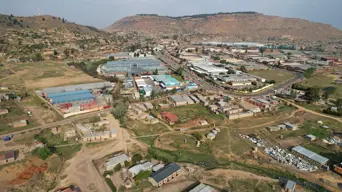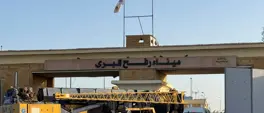Lesotho textile workers march against US-tariff job losses
AFP
31 October 2025 | 17:17The Trump administration slapped the small southern African nation with 50 percent tariffs -- the highest for any country -- in April, before lowering the levy to 15 percent in July.

The future of garment factories in Thetsane industrial area in Maseru hangs in the balance as the United States threatens massive tariffs. Picture: Sechaba Mokhethi/GroundUp
MASERU - Hundreds of textile workers marched in Lesotho's capital Friday in protest against massive job losses caused by US-imposed tariffs on exports.
The Trump administration slapped the small southern African nation with 50 percent tariffs -- the highest for any country -- in April, before lowering the levy to 15 percent in July.
Its textile sector -- the largest employer in the country of around 2.3 million people -- was particularly impacted as it had benefitted heavily from duty-free access to US markets under the African Growth and Opportunity Act (AGOA) which expired at the end of September.
About 400 people marched into Maseru's centre, carrying flags and chanting in a demonstration called by six trade unions.
"Lesotho must engage the US administration to reduce the tariffs to 10 percent," trade union leader Sam Mokhele said.
This would reduce competition with other textile-producing African countries, such as Eswatini and Kenya, that were hit with lower tariffs.
"Government must also negotiate with the US government for the immediate renewal of AGOA,"said Mokhele, who heads the National Clothing Textile and Allied Workers Union, as he handed a petition to the ministers of trade and labour, and the prime minister’s office.
AGOA, a cornerstone of US-Africa trade relations for 25 years, gave certain African countries preferential access to the US market by eliminating duties on cars, clothes and other items worth billions of dollars.
Washington in early October hinted it could support a one-year extension of the initiative, but has so far made no official announcement.
Lesotho's government in July declared a "state of disaster" over soaring unemployment, with the rate at 38 percent among young people.
It had previously warned that up to 40,000 jobs were at risk if AGOA was not renewed.
"Factories are closing because of the US-imposed tariffs, and without AGOA ... things are getting worse," said 53-year-old textile worker Mamakalo Mohapi.
"I started working in the textile industry in February 2000,"she told AFP on the sidelines of the march. "I don't want to lose my job, I am not yet ready to retire and I dont want to be supported by my children."
Get the whole picture 💡
Take a look at the topic timeline for all related articles.
















